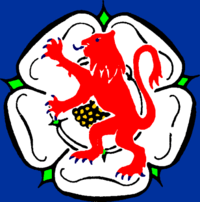Boothferry (district)
| Boothferry | |
|---|---|
 Boothferry shown within Humberside | |
| Area | |
| • 1974 | 159,257 acres (644.49 km2)[1] |
| Population | |
| • 1973[2] | 55,240 |
| • 1992[3] | 64,800 |
| History | |
| • Created | 1974 |
| • Abolished | 1996 |
| • Succeeded by | East Riding of Yorkshire, North Lincolnshire |
| Status | Borough |
| • HQ | Goole |
 | |
The Borough of Boothferry was, from 1 April 1974 to 1 April 1996, a local government district with borough status within the non-metropolitan county of Humberside. The district is now split between the East Riding of Yorkshire and North Lincolnshire.
The borough was formed from parts of three administrative counties: from the West Riding of Yorkshire came the former borough of Goole and Goole Rural District, from the East Riding of Yorkshire came Howden Rural District and from Lincolnshire, Parts of Lindsey came Isle of Axholme Rural District.
The district was named after the village of Boothferry, site of a bridge over the River Ouse, near the centre of the borough.
Parishes
At abolition, the district consisted of the following civil parishes:[4]
- Airmyn
- Amcotts
- Asselby
- Barmby on the Marsh
- Belton
- Blacktoft
- Broomfleet
- Bubwith
- Crowle
- Eastoft
- Eastrington
- Ellerton
- Epworth
- Foggathorpe
- Garthorpe and Fockerby
- Gilberdyke
- Goole
- Goole Fields
- Gowdall
- Haxey
- Holme-upon-Spalding Moor
- Hook
- Hotham
- Howden
- Keadby with Althorpe
- Kilpin
- Laxton
- Luddington and Haldenby
- Newport
- North Cave
- Owston Ferry
- Pollington
- Rawcliffe
- Reedness
- Snaith and Cowick
- Spaldington
- Swinefleet
- Twin Rivers and Wressle
- West Butterwick
- Wroot
References
- ↑ Local government in England and Wales: A Guide to the New System. London: HMSO. 1974. p. 60. ISBN 0-11-750847-0.
- ↑ Registrar General's annual estimated figure mid 1973
- ↑ OPCS Key Population and Vital Statistics 1992
- ↑ "The Humberside (Structural Change) Order 1995". Office of Public Sector Information. 1995. Retrieved 12 January 2009.
Coordinates: 53°42′N 0°53′W / 53.70°N 0.88°W